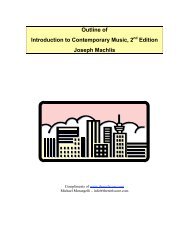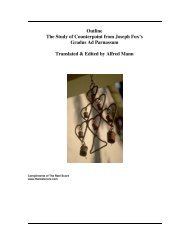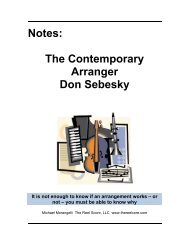An Outline of The History of Western Music Grout ... - The Reel Score
An Outline of The History of Western Music Grout ... - The Reel Score
An Outline of The History of Western Music Grout ... - The Reel Score
You also want an ePaper? Increase the reach of your titles
YUMPU automatically turns print PDFs into web optimized ePapers that Google loves.
i) Current belief is that the church and synagogue liturgies developed<br />
independently<br />
ii) Was influenced by the synagogue practice <strong>of</strong> readings specific to a<br />
calendar and public commentary upon them in a public meeting house<br />
(3) Other influences<br />
i) As the Church spread from Jerusalem it continued to pick up musical<br />
influences from diverse areas<br />
a- psalm singing from the monasteries and churches <strong>of</strong> Syria<br />
b- Byzantium with the classification <strong>of</strong> the chant repertory into 8 modes as<br />
well as the borrowing <strong>of</strong> the chants themselves<br />
(4) Between 9th & 16th Centuries a uniform practice was developed with authority<br />
emanating from Rome.<br />
i) <strong>The</strong>ory & practice<br />
ii) Roman chant supersede the local variants<br />
a- Gallican in France<br />
b- Celtic Chant in Ireland & parts <strong>of</strong> British Isles<br />
c- Beneventan in Southern Italy<br />
d- Old Roman in Rome<br />
e- Visigothic & Mozarabic in Spain<br />
f- Ambrosian in Milan<br />
c) Early Christian <strong>Music</strong>al Thought<br />
(1) Early writers like the Greeks believed the value <strong>of</strong> music was its power to<br />
inspire divine thought and influence for good or evil the character <strong>of</strong> its<br />
listeners<br />
(2) Did not deny that beautiful music was pleasurable but held to the Platonic<br />
principle that beautiful existed to remind us <strong>of</strong> the divine<br />
(3) <strong>Music</strong> was a servant <strong>of</strong> religion only music that opened the mind to Christian<br />
Teachings and disposed to holy thoughts was worthy <strong>of</strong> hearing in Church<br />
d) Early <strong>Music</strong> <strong>The</strong>orists<br />
(1) <strong>The</strong>ory and philosophy <strong>of</strong> the ancient world was gathered, summarized,<br />
modified, and transmitted to the West during this era<br />
(2) Martianus Capella<br />
i) Produced a textbook on the 7 liberal arts - "<strong>The</strong> Marriage <strong>of</strong> Mercury and<br />
Philology" (early 5th Century)<br />
a- Verbal arts: grammar, dialectic, & rhetoric or the trivium<br />
b- Mathematical arts: geometry, arithmetic, astronomy, & harmonics or the<br />
quadrivium (by Boethius)<br />
ii) Disguised as speeches made by bridesmaids at the wedding <strong>of</strong> Mercury &<br />
Philology<br />
(3) Boethius (ca. 480 - 524/26)<br />
i) Most revered and influential authority on <strong>Music</strong> is the Middle Ages<br />
ii) Wrote "De institutione musica" ( <strong>The</strong> Fundamentals <strong>of</strong> <strong>Music</strong>)<br />
iii) Compiled from Greek sources





